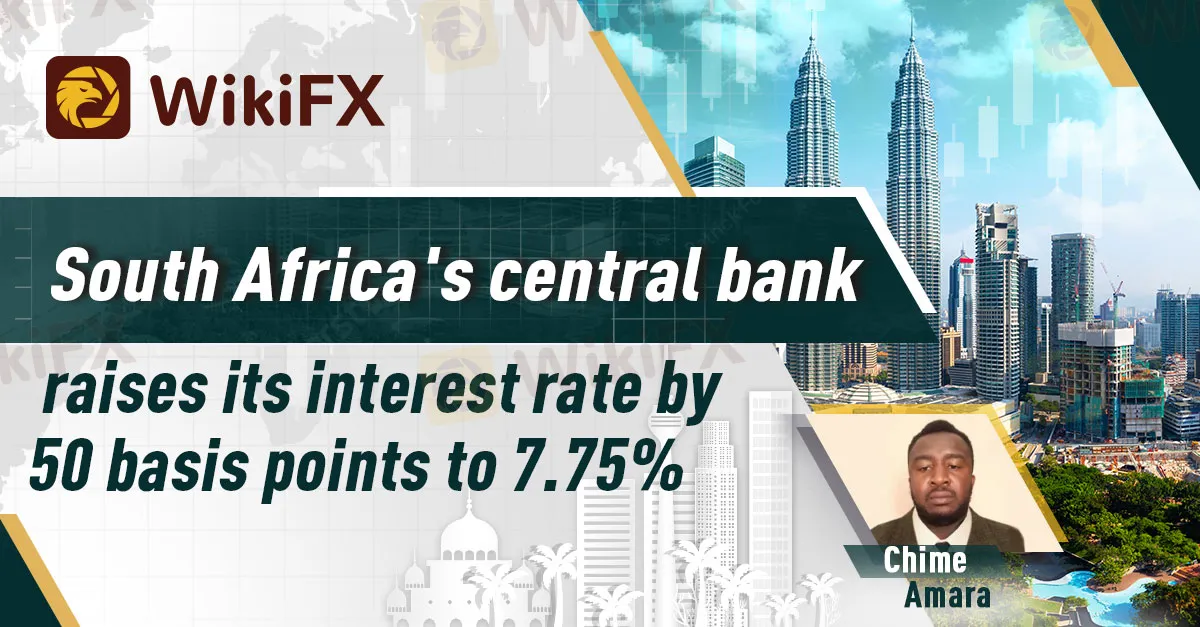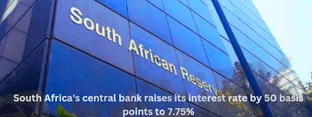简体中文
繁體中文
English
Pусский
日本語
ภาษาไทย
Tiếng Việt
Bahasa Indonesia
Español
हिन्दी
Filippiiniläinen
Français
Deutsch
Português
Türkçe
한국어
العربية
South Africa's central bank raises its interest rate by 50 basis points to 7.75%
Abstract:South Africa's central bank has raised its main lending rate by 50 basis points to 7.75% last week's Thursday in an effort to curb it's rising inflation rate.

By: Chime Amara

South Africa's central bank has raised its main lending rate by a surprising 50 basis points to 7.75% in an effort to curb it's rising inflation rate. The current hike came much higher than the market expectations of just 25 basis points.
This marks the ninth consecutive time the South African Reserve Bank has raised rates, adding a total of 425 bps to the repo rate since tightening policy in November 2021.
The move comes after February consumer inflation in South Africa rose to 7.0% year on year from 6.9% in January, indicating that nationwide power cuts may be driving price pressures. The central bank aims to keep inflation between 3% and 6%.
The Monetary Policy Committee was divided in its decision, with three members advocating for a 50 bps increase and two favoring a 25 bps increase. Central bank governor Lesetja Kganyago cited risks to the inflation outlook, stating that despite easing of producer price and food inflation, global price levels remain elevated, while electricity prices and other administered prices present short- and medium-term risks.
Kganyago also noted that the headline inflation rate in South Africa has been primarily driven by fuel, electricity, and food price inflation. He further revealed that he expects food and fuel inflation to ease gradually, up to 4.9% by 2024 and 4.5% in 2025.
Market analysts expressed surprise at the central bank's decision, with some noting that the higher outlook towards food and core goods inflation prompted the move. FNB Chief Economist, Mamello Matikinca-Ngwenya, said the road ahead is precarious, indicating uncertainty in the economic growth prospects. The rate hike has also triggered a surge in the rand, which rose nearly 2% against the dollar.
Overall, the central bank's decision to raise interest rates by 50 basis points is a sign of its determination to address rising inflation, even if it comes as a surprise to many market analysts. The impact of the rate hike on the South African economy remains to be seen, but the central bank's cautious approach suggests that it is closely monitoring the situation and taking steps to address any risks to economic stability.

Disclaimer:
The views in this article only represent the author's personal views, and do not constitute investment advice on this platform. This platform does not guarantee the accuracy, completeness and timeliness of the information in the article, and will not be liable for any loss caused by the use of or reliance on the information in the article.
Read more

Advanced Markets Exposed: Slippage, Copy Trade Errors & Losses
Have you made profits using the copy trade strategy implemented by Advanced Markets? But did the withdrawal stop as the company cited questionable trades? Have you failed to receive any email from this broker regarding the investigation it claimed? Are high slippages and trade losses regular with Advanced Markets? These are nothing but scams. Many traders have openly criticized the UK-based broker for these suspicious forex trading activities. In this article, we will share trader comments against the broker. Keep reading!

Plus500 Launches $90 Million Share Buyback Programme
Plus500 has officially launched a $90 million share buyback programme. The initiative forms part of the company’s wider plan to distribute $165 million to investors.

SimpleFX Scam Alert: Here’s Why You Should it?
While you are free to choose the broker that suits your needs, it is crucial to remain cautious during the selection process. Many brokers may appear genuine at first glance, but in reality, they operate fraudulently. SimplyFX is one such broker that raises serious concerns. Read this article to understand why we consider SimplyFX to be a potential scam broker.

An In-depth Guide to Forex Spread Calculation
While the calculation of the forex spread (the difference between the exchange rate at which a forex broker buys and sells the currency) is simple, yet some of us are left confused. To make it clear, we have come up with calculation and realistic examples to make you understand it better. Read on!
WikiFX Broker
Latest News
European leaders to join Zelensky at White House meeting with Trump
Where is ThinkMarkets Broker Licensed to Operate?
Plus500 Launches $90 Million Share Buyback Programme
BlackBull Markets and CopyTrade Market Formalise Integration
IG Japan Ends Discount Program on Aug 17
Strongest Level for MYR Coming Soon?!
Trader in Thane Duped of ₹4.11 Cr in Online Scam
Fraud Alert: FCA Warns Against 10 Unlicensed Brokers
IG Securities' “Introductory Programme” Comes to an End!
An In-depth Guide to Forex Spread Calculation
Currency Calculator


